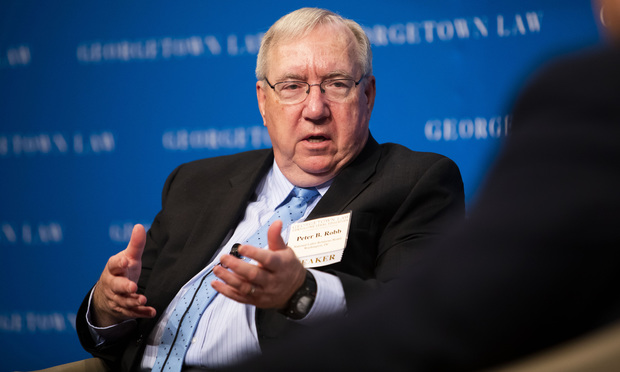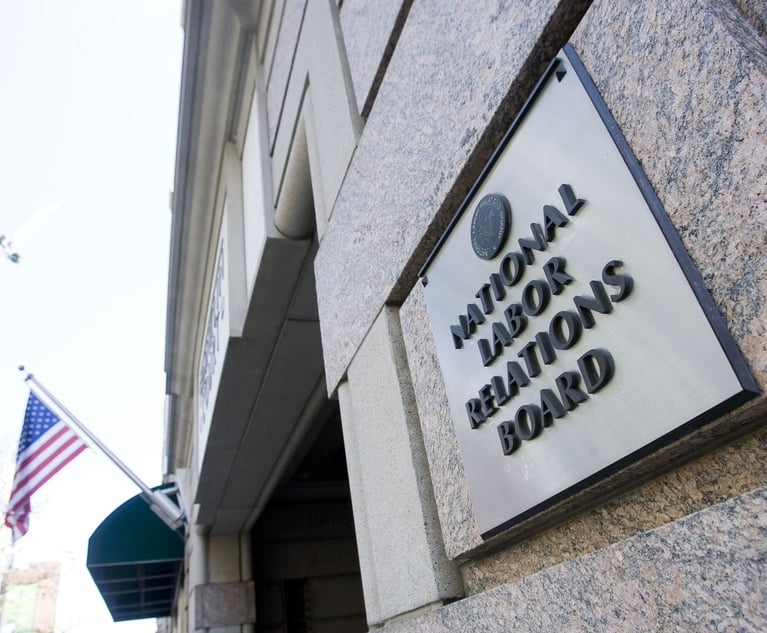Laying Off or Shutting Down? Here's What You Should Know From the NLRB General Counsel
"Although we are in an unprecedented situation, I wish to make the public aware of several cases in which the board considered the duty to bargain during emergencies, [and I] hope that these summaries prove useful to those considering this issue during these challenging times," read Peter Robb's memo.
March 30, 2020 at 05:52 PM
4 minute read
 Peter Robb, general counsel of the National Labor Relations Board.
Peter Robb, general counsel of the National Labor Relations Board.
As COVID-19 raises questions for employers over shutdowns and layoffs, a new memo from general counsel Peter Robb of the National Labor Relations Board offers some insights, but no clear guidance.
"The Coronavirus pandemic has prompted many questions regarding the rights and obligations of both employers and labor organizations, particularly in light of responsive measures taken to contain the virus. Sometimes these measures have been taken out of prudence; other times they have been required by state, local or federal orders," Robb's memo begins.
It continues, "Regardless of the reason for any given response to the spread of the virus, many parties are considering the impact on the duty to bargain. Although we are in an unprecedented situation, I wish to make the public aware of several cases in which the board considered the duty to bargain during emergencies, [and I] hope that these summaries prove useful to those considering this issue during these challenging times."
The March 27 memo includes four cases involving the duty to bargain during public emergencies, and five cases concerning the duty to bargain during emergencies particular to an individual employer.
It first summarizes four cases in which employers in emergency situations, such as hurricanes or the terrorist attack of Sept. 11, 2001, took unilateral action without bargaining with unions.
Basically, these cases show "if the government orders a shutdown of a plant, the employer doesn't have to bargain over the shutdown," said Lori Armstrong Halber, an employment law partner in the Philadelphia office of Reed Smith.
But Halber told Corporate Counsel the company and its general counsel would still have to bargain with its unions "over the effect of the shutdown, such as severance pay, layoff terms, and whether benefits would continue."
If the employer has any discretion, such as doing a partial shutdown, the company might have to bargain over how to proceed, she added.
The key point of the memo, she said, distinguishes between public emergency situations and those individual to an employer, such as loss of financial credit or shortage of raw resources.
Employment attorney Stephanie Gournis, a partner with Faegre Drinker Biddle & Reath in Chicago, said she was happy to see the memo, but she was hoping for more guidance. "I'm somewhat surprised that the general counsel didn't take the opportunity to take a position or offer guidance, but only to list cases," Gournis said.
The takeaway, she said, "is that this particular board will recognize a sort of exception for emergent situations when employers act unilaterally. The takeaway also is that this exception is limited, and one needs to be careful of using it too broadly."
Gournis said she found it interesting that general counsel Robb "spent so much time talking about the last case involving a hospital" and even quoted from the dissent in that case.
She was referring to a 2011 case during the Obama administration in which Virginia Mason Hospital in Seattle unilaterally imposed flu prevention policies, such as wearing masks, on 600 registered nurses without union notice. Of the nine cases listed, this one contained the longest summary.
The case strikes a chord in today's world of hospitals and their general counsel struggling to stay abreast of COVID-19.
In this case, the board held that the employer violated the National Labor Relations Act by acting unilaterally and not giving the union an opportunity to bargain over the policies. The new procedures were enacted to prevent the spread of flu within the hospital, though it was not a widespread pandemic situation.
Robb's summary notes that board member Brian Hayes dissented and said the board was reading previous case law too narrowly. Hayes argued that a company should be broadly protected "when an employer … unilaterally establish[es] rules that are designed to protect the 'core purpose of its enterprise.' "
The fact that Robb "spent more time on Hayes' dissent than on some of the majority opinions, to me, was an insight that this particular board at this time would likely look at the comment that Hayes made in the dissent, and be willing to expand the extenuating exigent circumstances exemption further," Gournis said.
In other words, Gournis believes a similar hospital case in today's COVID-19 environment and before a Trump administration board would likely find the employer, not the union, winning.
This content has been archived. It is available through our partners, LexisNexis® and Bloomberg Law.
To view this content, please continue to their sites.
Not a Lexis Subscriber?
Subscribe Now
Not a Bloomberg Law Subscriber?
Subscribe Now
NOT FOR REPRINT
© 2025 ALM Global, LLC, All Rights Reserved. Request academic re-use from www.copyright.com. All other uses, submit a request to [email protected]. For more information visit Asset & Logo Licensing.
You Might Like
View All


Trump Fires EEOC Commissioners, Kneecapping Democrat-Controlled Civil Rights Agency

Testing Legal Authority, Trump Fires NLRB Member, Leaving Panel Without Quorum
3 minute readLaw Firms Mentioned
Trending Stories
- 1Stevens & Lee Hires Ex-Middle District of Pennsylvania U.S. Attorney as White-Collar Co-Chair
- 2Alameda Judge Ursula Jones Dickson Chosen as District Attorney
- 3'A Long 6 Years': No $150M for Goldman Sachs Investors
- 4Ex-Appellate Court Judges Launch Boutique Focused on Plaintiffs Appeals
- 5Judge Tanks Prevailing Pittsburgh Attorneys' $2.45M Fee Request to $250K
Who Got The Work
J. Brugh Lower of Gibbons has entered an appearance for industrial equipment supplier Devco Corporation in a pending trademark infringement lawsuit. The suit, accusing the defendant of selling knock-off Graco products, was filed Dec. 18 in New Jersey District Court by Rivkin Radler on behalf of Graco Inc. and Graco Minnesota. The case, assigned to U.S. District Judge Zahid N. Quraishi, is 3:24-cv-11294, Graco Inc. et al v. Devco Corporation.
Who Got The Work
Rebecca Maller-Stein and Kent A. Yalowitz of Arnold & Porter Kaye Scholer have entered their appearances for Hanaco Venture Capital and its executives, Lior Prosor and David Frankel, in a pending securities lawsuit. The action, filed on Dec. 24 in New York Southern District Court by Zell, Aron & Co. on behalf of Goldeneye Advisors, accuses the defendants of negligently and fraudulently managing the plaintiff's $1 million investment. The case, assigned to U.S. District Judge Vernon S. Broderick, is 1:24-cv-09918, Goldeneye Advisors, LLC v. Hanaco Venture Capital, Ltd. et al.
Who Got The Work
Attorneys from A&O Shearman has stepped in as defense counsel for Toronto-Dominion Bank and other defendants in a pending securities class action. The suit, filed Dec. 11 in New York Southern District Court by Bleichmar Fonti & Auld, accuses the defendants of concealing the bank's 'pervasive' deficiencies in regards to its compliance with the Bank Secrecy Act and the quality of its anti-money laundering controls. The case, assigned to U.S. District Judge Arun Subramanian, is 1:24-cv-09445, Gonzalez v. The Toronto-Dominion Bank et al.
Who Got The Work
Crown Castle International, a Pennsylvania company providing shared communications infrastructure, has turned to Luke D. Wolf of Gordon Rees Scully Mansukhani to fend off a pending breach-of-contract lawsuit. The court action, filed Nov. 25 in Michigan Eastern District Court by Hooper Hathaway PC on behalf of The Town Residences LLC, accuses Crown Castle of failing to transfer approximately $30,000 in utility payments from T-Mobile in breach of a roof-top lease and assignment agreement. The case, assigned to U.S. District Judge Susan K. Declercq, is 2:24-cv-13131, The Town Residences LLC v. T-Mobile US, Inc. et al.
Who Got The Work
Wilfred P. Coronato and Daniel M. Schwartz of McCarter & English have stepped in as defense counsel to Electrolux Home Products Inc. in a pending product liability lawsuit. The court action, filed Nov. 26 in New York Eastern District Court by Poulos Lopiccolo PC and Nagel Rice LLP on behalf of David Stern, alleges that the defendant's refrigerators’ drawers and shelving repeatedly break and fall apart within months after purchase. The case, assigned to U.S. District Judge Joan M. Azrack, is 2:24-cv-08204, Stern v. Electrolux Home Products, Inc.
Featured Firms
Law Offices of Gary Martin Hays & Associates, P.C.
(470) 294-1674
Law Offices of Mark E. Salomone
(857) 444-6468
Smith & Hassler
(713) 739-1250






